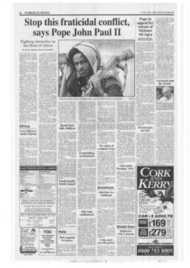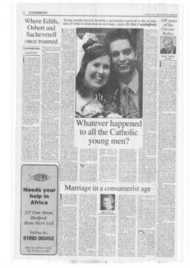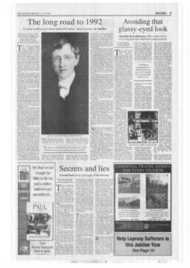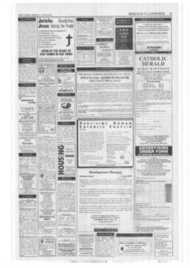Page 8, 2nd June 2000
Page 8

Report an error
Noticed an error on this page?If you've noticed an error in this article please click here to report it.
Tags
Share
Related articles
Sensing The National Mood
Gibberish: Language Of The Future
Pondering A Right Royal Dilemma
Desert Orchid Is Racing To Heaven
Loser In The Kelly Affair
The Queen's English, bloody but unbowed
Media Matters
Nick Thomas
RADM 4 has just repeated Pronounced BBC, John Humphrys' two-part history of the corporation's ever-vexed relationship with the phonetics of the English language. Many of my readers, I imagine, will have caught the second half, broadcast on bank holiday Monday, but will have been unable to sit by the radio at llam to hear the first. For me it was the other way round — but I did manage to get hold of a tape.
Part One was not entirely innocent of the smug funpoking at its amateurish, public school-past, which tends to characterise any BBC autobiography, though to be fair, Lord Reith's response to the Beeb's perceived responsibilities was sometimes comical. I imagine Part Two was equally smug in its celebration of the high standards of professionalism that now inform the great broadcaster; 1 am obliged to imagine, because the tape I was sent, though clearly labelled to the contrary, consisted only of Part One. Oh well.
The origins of the BBC voice are more interesting and less depressing than its modem degradation, anyway, and the prewar story was full of fascinating tit-bits. There was Alistair Cooke, recalling George Bernard Shaw's autocratic but hilarious chairmanship of the Pronunciation Committee in the 1930s, and the debate over whether "canine" should have a long or short A. Apparently this was once a transatlantic difference, the latter form being used over here. One up to the Yanks, then. But what we now think of as the American stress in "laboratory" was also a British form, exiled by Reith's experts because it sounded too much like "lavatory" on radio.
More gripping than these anecdotes, though, was the knotty problem of region and class. In a glorious archive recording, the phoneticist Arthur Lloyd James addressed the nation's children on the diversity of their voices, and on the need to master "school English". Then he played two records of children's conversation, one from Devon, the other from Islington, and both well-nigh impenetrable.
This is a lesson that should be remembered more often. if a broadcaster is to serve the whole nation, its voices must be not only comprehensible in every region, but innocent of any regional bias likely to offend the majority . BBC English, Standard English, RP, call it what you like. Nobody, though, seems to call it the Queen's English any more, which is a pity, because that is a concept particularly pertinent to the BBC's function. It is not, necessarily, the English spoken by the Queen, but the form most accessible to her subjects worldwide, most of whom have a different first language. Fortunately Radio 4, and by extension the World Service, still has a number of outstanding practitioners on its books, mellifluously reading the news as though the patronising, populist madness of regional diversity on air had never taken hold. It is very much in evidence in the weather forecasts, of course, but somehow this does not offend. Perhaps this is because the phenomenon of the wise old countryman, squinting at the clouds before assessing the likelihood of rain in a rich bucolic brogue, is also part of our quaint, gentler past.
In any case, we owe our gratitude to Charlotte Green, Peter Donaldson and their equally cut-glass colleagues for maintaining a haven from the brash, laddish estuary vowels that seem to be inescapable elsewhere. That they should be criticised for sounding educated is perverse; we should expect, nay demand that the BBC hire only people whose tones of erudition and politesse form naturally in their mouths. Those who complain that these exemplary broadcasters speak with the voice of the posh, southern ruling class are merely chippy, and wrong. It is actually the voice of civilisation. Of course this might have been the thesis expressed in Part Two of Pronounced BBC, but somehow I doubt it.
blog comments powered by Disqus













